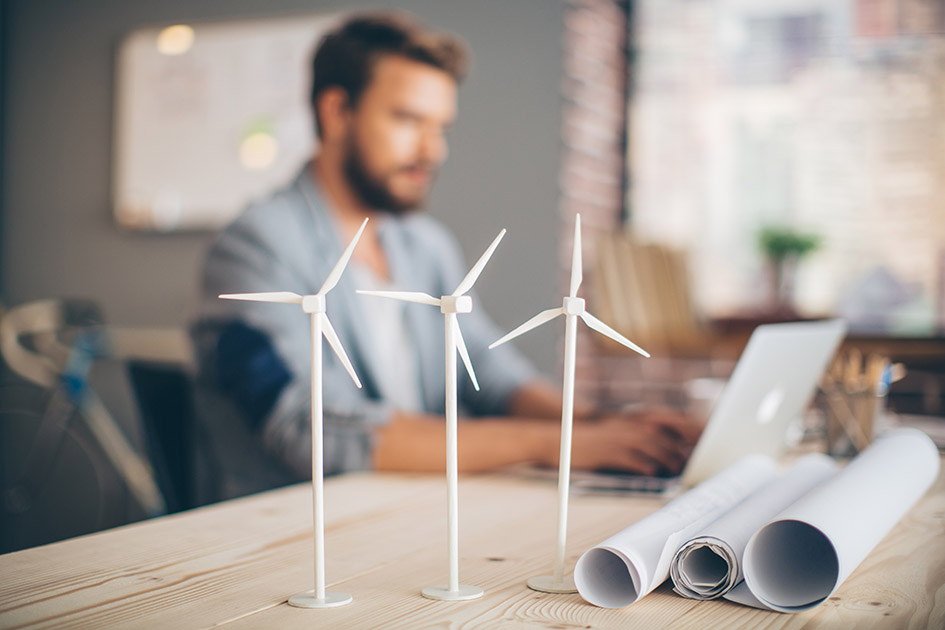Topics
Shaping theEnergyTransition
Moving from a nuclear and fossil energy system to renewable energies requires new production capacities, reduced energy consumption, and more efficient use. Citizens, municipalities, businesses, and policy makers will need to work together to make the transition possible.
The German energy transition ("Energiewende") is without a doubt one of the largest and most complex deliberate transformations of an established industrial economy. There are no historic precedents to refer back to. This transformation would not have been possible without the Wuppertal Institute and fellow pioneers that provide the analyses and strategies to match the political will.
The "Energiewende" is often equated with the scaling-up of renewables and their integration into the grid. This interpretation is much too narrow: Firstly, advances in energy efficiency are equally important; secondly it frames the "Energiewende" as a purely technological challenge.

A Range of Challenges
In reality, the energy transition ("Energiewende") faces a diverse range of socio-technical and political challenges. On the one hand, there is the complex technological and economic task of integrating renewables into the existing system, especially solar and wind with their fluctuations, along with new uses for electricity in transport and heating. On the other hand, it is important to combine renewables and efficiency technologies as systemic solutions.
Potential Resource Conflicts
In implementing the "Energiewende", especially focusing on climate protection and the phase-out of nuclear energy, the manifold synergies and potential conflicts with other environmental goals must not be ignored. Regarding resources, the key technologies of the Energiewende must be subjected to close examination of their use of critical resources (e.g. rare earths, toxic materials) and their conflicts with alternative uses of space (e.g. energy vs. biodiversity). Nevertheless, the balance in comparison to the conventional energy system is often positive.
Moving Forward Together
All political levels (from the EU to the federal level, provinces and regions down to cities and municipalities) need to work together to find the right path for the transition. This requires a consistent multi-level approach to governance as well as long-term orientation beyond election cycles.
From Consumer to Prosumer
Direct participation of citizens is an essential societal component of the "Energiewende". With energy production becoming more decentralised, it will become much more visible and relevant to all of us. This allows consumers to take on a more active role. By installing their own solar panels or joining others to generate "citizen energy", they turn into "prosumers" who consume and produce at the same time.
Lowering Energy Demand
Over the last few decades, significant improvements in energy efficiency have been achieved, even though huge potentials remain untapped. Unfortunately, improvements are often counteracted by economic growth or rebound effects. This is where sufficiency comes in. As a strategy, it aims at reducing energy demand without losses in comfort. Energy sufficiency addresses the question of how demand for heating and lighting can be limited and how patterns of usage can change. There is next to no research on how this very cost-effective strategy can be utilised politically and turned into business models, creating an exciting opportunity for the Wuppertal Institute.
Shaping the Transition
The "Energiewende" is not a linear process; it involves various phases and central decision points (e.g. regarding the build-up of new infrastructure). The boundaries between different structures (heating, electricity, mobility) are becoming fuzzy and the speed and complexity of the overall system are increasing. The Wuppertal Institute is contributing to a better understanding of the system, the socio-technical interactions within it, and the possibilities for shaping the various transformations.

Energy efficiency is the slumbering giant of the energy transition. Waking it up means drastically reducing energy waste, which will enable an energy system based on renewables to be achieved faster.
Topics
Research foci in the field of energy research are:
News
Here you find up-to-date information on research findings and activities in the field of energy.
News on the topic

Wuppertal Institute Mourns the Loss of Professor Akio Morishima
Former member of the International Advisory Board passes away at the age of 89

Pathways towards a Green Economy in Egypt
Analysis of three Egyptian value chains and recommendations for environmentally friendly business practices published

Silent Climate Killers: Non-CO2 Greenhouse Gases in the International Carbon Market
Carbon Mechanisms Review on non-CO2 greenhouse gases published
Publi-cations
You find all scientific publications on our publication server:
Projects
Research in the field of energy takes place in an inter- and transdisciplinary context. In the following you find selected sample projects. A complete list is available here.
